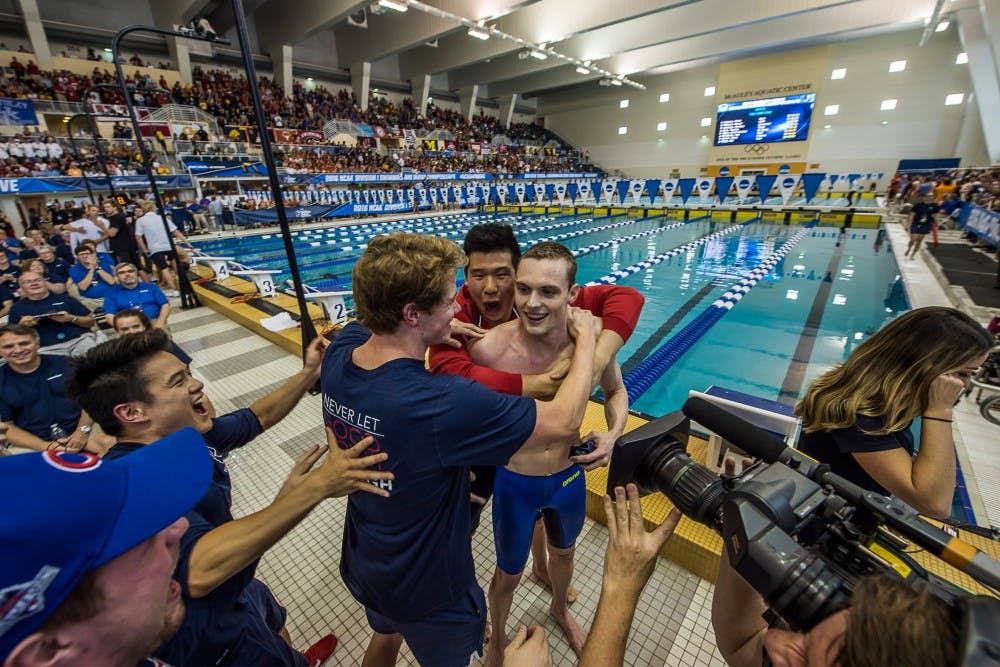
Then-senior Chris Swanson capped off a largely successful 2015-2016 season with Penn's first ever NCAA Championship in the men’s 1,650-yard freestyle
Credit: Courtesy of Peter H. Bick and Swimming World MagazineWhen asked to describe last year’s edition of Penn swimming and diving in two words, current senior Grant Proctor was at a loss.
Across the pool deck, a teammate had a quick answer: “The best.”
Despite not winning a team Ivy League title in either the men’s or women’s competition, Penn swimming had historic seasons. Capping it all off was then-senior Chris Swanson winning the Quakers’ first-ever NCAA title in the men’s 1,650-yard freestyle. The national title was the icing on an impressive year for the Red and Blue captain who also won three Ivy league titles, setting two conference records in the process.
“You can’t replace somebody who was the best swimmer in America at his event. But, fortunately, we have a very good distance group,” coach Mike Schnur said. “We’re going to miss Chris a lot at [Ivies and NCAAs] ... but Alex [Peterson], Taylor [Uselis] and Matt Haigh will step right up.”
The senior class led the Quakers both in and out of the pool. Of last year’s six Ivy titles, five came from now-graduated captains Swanson and Eric Schultz. Schnur attributed the senior leadership and hunger as being a big part of the team success.
“We had great leadership. We had people who had hunger. ... There was a sense of urgency because of our senior class,” he said. “And it was also an Olympic year ... so we knew it was an all or nothing view for a lot of them.”
Twelve men and two women qualified for the Olympic Trials. None of the Quakers’ athletes competing expected to make the Olympic team, as only the top two swimmers in each event are selected for a berth to Rio. Still, the sheer number of Penn swimmers present was unprecedented.
The only non-senior to win an Ivy title was then-freshman Mark Andrew, who set an Ivy League record in the 400-yard individual medley.
“Training with the team [was a big factor in my success]. In high school, I didn’t have the same opportunity to train everyday with guys who are doing the same thing I am.” Andrew said.
Last year’s men’s team placed third in the conference behind Princeton and Harvard despite all the individual accomplishments. Now, after the loss of perhaps one of the best senior classes Penn swimming has ever seen, the men look to improve upon that mark.
“It’s not about the top three guys on the team. It’s about all seventeen swimmers and all three divers that you bring to [the Ivy League championship]. Everybody needs to do their best to support the team.” Andrew said.
Meanwhile, the women’s team quietly put together a widely successful season both as a team and in terms of individual accomplishments. They put together a fourth-place finish in the Ivies but the highest points total in school history. Virginia Burns won the lone Quakers’ championship in the 500-yard freestyle. It was the second win in that event in two years for the current junior.
She credited then-freshman Madison Visco for pushing her in training. “I think that after winning the first time [I] had a whole new approach in ... training, and it helped having the freshmen come in last year like Visco to help push me through it,” Burns said.
The women also set nine new school records last year, including one in the 200-yard butterfly set by Olympic Trials representative Nancy Hu. Schnur was impressed by his team’s work ethic and hunger last year.
“Our team last year trained hard. The women had a goal in mind ... and they continued to get better throughout the season, and I think we’re on the exact same track right now,” Schnur said.
The general mood at Sheerr Pool seems to be one of optimism. Great 2015-16 seasons give this year’s editions a great platform to build on. The youth of the teams are a positive as well, despite the men losing a historic senior class, both teams are equipped to improve again this season.
“We have a lot of younger kids who are stepping into those roles to replace what we lost last year.” Schnur said. “We’re not going to replace [the seniors we lost]. The younger [swimmers] just have to keep getting better ... and we’ll be fine.”
While last year’s teams may have been “the best,” this year comes with a great chance for improvement.
The Daily Pennsylvanian is an independent, student-run newspaper. Please consider making a donation to support the coverage that shapes the University. Your generosity ensures a future of strong journalism at Penn.
Donate




